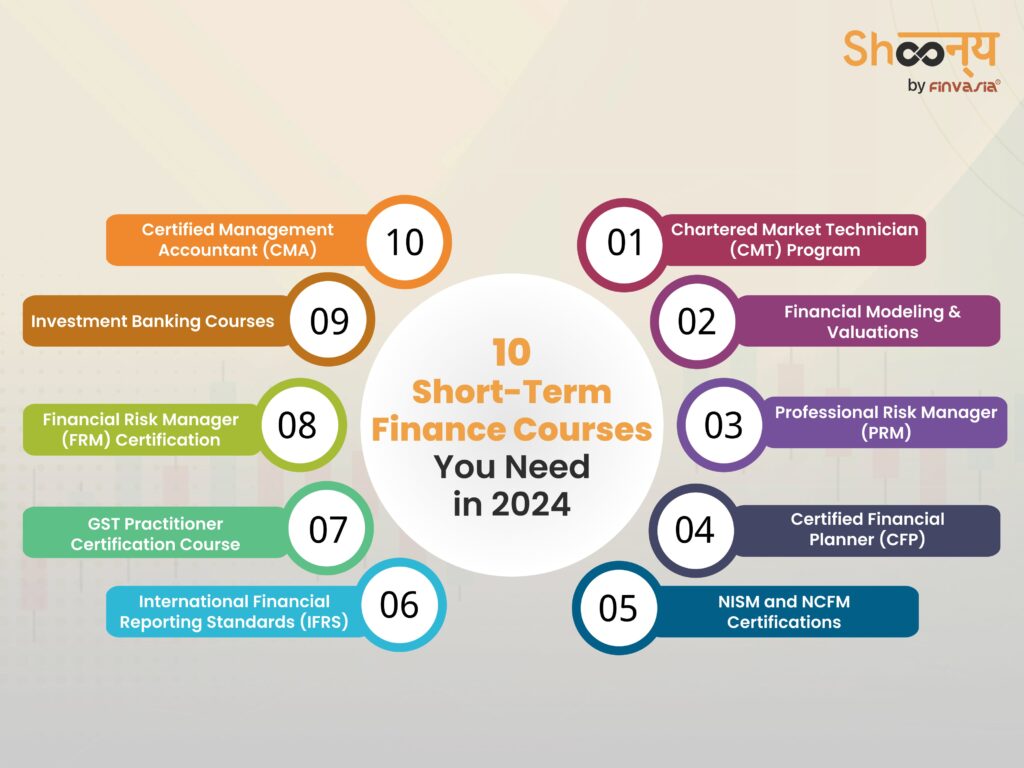With digitalisation and fintech innovations, there is a massive transformation happening worldwide. Nowadays, everyone is eager to upgrade their finance skills and knowledge to keep pace with these trends. Instead of spending time on long-term traditional degrees, the new approach is to opt for short-term finance courses.
Whether you’re looking to advance your career or simply broaden your knowledge, the short courses in finance are super effective. You can learn essential skills like investment management, cryptocurrency, fintech applications, trading strategies, etc.
Curious about the options available?
Let’s dive into the best short term finance courses in India for 2024.
- Short-Term Finance Certifications
- Short-Term Finance Courses You Can’t Miss – 2024
- Chartered Market Technician (CMT) Program
- Financial Modeling & Valuations
- Professional Risk Manager (PRM)
- Certified Financial Planner (CFP)
- NISM and NCFM Certifications
- International Financial Reporting Standards (IFRS)
- GST Practitioner Certification Course
- Financial Risk Manager (FRM) Certification
- Investment Banking Courses
- Certified Management Accountant (CMA)
- Things to Think About Before Picking a Finance Course
- Conclusion
- FAQs|Best Short-Term Finance Courses for 2024
Short-Term Finance Certifications
Short-term finance certifications courses in finance are a great way to give you useful financial knowledge in a short amount of time. They’re perfect if you want to switch to a finance career or stay up-to-date with industry changes.
Benefits of Short-Term Certification Courses in Finance
- Get up-to-date with key financial skills faster than traditional programs.
- You can add valuable certifications to your resume.
- These short courses in finance cover budgeting, financial analysis, or investment. You can choose the one that interests you.
- You can meet other professionals and students in the field, creating connections that could lead to new opportunities.
- These courses are usually more budget-friendly compared to long term financial certifications.
Short-Term Finance Courses You Can’t Miss – 2024
With the best short term finance courses, you can learn what you need quickly and efficiently.

| Course Name | Specialisation |
| Chartered Market Technician (CMT) Program | Technical Analysis |
| Financial Modeling & Valuations | Financial Modeling |
| Professional Risk Manager (PRM) | Risk Management |
| Certified Financial Planner (CFP) | Financial Planning |
| NISM and NCFM Certifications | Securities Markets |
| International Financial Reporting Standards (IFRS) | Financial Reporting |
| GST Practitioner Certification Course | Taxation |
| Financial Risk Manager (FRM) Certification | Risk Management |
| Investment Banking Courses | Investment Banking |
| Certified Management Accountant (CMA) | Financial Management |
1. Chartered Market Technician (CMT) Program
CMT is a global short term certification course in finance for professionals who wish to learn and use technical analysis. If you love reading about market trends and want to help people improve investment strategies, this program is a great fit for you.
You need to pass three exams:
- Level I: Learn the basics of technical analysis and key terms.
- Level II: Apply your knowledge to real-world scenarios and techniques.
- Level III: Combine everything you’ve learned and use it in practical, advanced situations.
Who should consider this short term finance course?
The CMT is globally recognised. It is ideal for those interested in market trends, risk management, and investment strategies.
2. Financial Modeling & Valuations
This short term finance course offers crucial knowledge in finance, investment banking, or corporate finance. In this, you will learn to create a model to represent the financial performance of a company or project.
- You can learn how to use income statements, balance sheets, and cash flow statements.
- Make models to project future earnings, expenses, and cash flows.
- You can learn methods like discounted cash flow (DCF) and comparable company analysis.
- This short term certification course in finance includes three individual courses with certificates awarded for each course.
Additionally, you will earn a certificate for the entire program.
- Certificate in Financial Modeling & Valuation
- Certification in Data Analytics
- Certification in Business Intelligence
3. Professional Risk Manager (PRM)
PRM designation is another globally recognised certification for risk management professionals. This short term finance course is offered by the Professional Risk Managers’ International Association (PRMIA). It focuses on financial theory, risk measurement, option theory, financial instruments, etc.
To qualify for the PRM program, you must meet one of the following criteria:
- Hold a graduate degree (e.g., MBA, MSF, MQF) and a current PRMIA Sustaining or RIM level membership.
- Be a CFA Charterholder.
- Have a bachelor’s degree with 2 years of full-time work experience in financial services or risk management.
- Have 4 years of full-time work experience in financial services or risk management.
The PRM certification requires passing a series of exams within a two-year period.
You must score 60% or higher on each exam to pass.
4. Certified Financial Planner (CFP)
The CFP certification is one of the trending short term courses recognised globally. It has rigorous standards for education, experience, and ethical conduct.
It is highly favored short term certification courses in finance online.
To earn the certification of this short term certification, you must:
- Finish a CFP-board registered education program.
- Pass the CFP Exam
- Gain Experience in financial planning.
One you gain the certification and the three year experience in the field, you can apply for your license.
5. NISM and NCFM Certifications
NISM (SEBI) and NCFM (National Stock Exchange of India) are one of the best short term finance courses in India.
NISM (National Institute of Securities Markets) Certifications
These short term certification courses in finance help professionals in the securities markets. They are part of the Securities and Exchange Board of India (SEBI) regulations.
These are open to anyone interested in the financial markets.
NISM offers various modules, including:
- Securities Operations and Risk Management
- Mutual Fund Distributors
- Investment Adviser
NISM certifications need re-validation every three years.
NCFM (NSE Academy Certification in Financial Markets)
NCFM certifications, provided by the NSE, offer specialised knowledge in various financial areas.
NCFM offers a range of modules, including:
- Capital Market (Dealers) Module
- Derivatives Market (Dealers) Module
- Mutual Funds Module
Both NISM and NCFM certifications offer valuable knowledge for the financial industry.
- NISM: Focuses broadly on securities markets and includes mandatory certification examinations as per SEBI regulations.
- NCFM: Offers specialised modules with a strong focus on practical market skills closely associated with the National Stock Exchange.
6. International Financial Reporting Standards (IFRS)
This short term course teaches the global standards for financial reporting, which are used by companies worldwide.
You can learn:
- How to prepare and read financial statements according to IFRS.
- How to recognise revenue and expenses in financial reports.
- How to report assets, liabilities, and equity.
It is useful for accountants, auditors, and financial analysts working with international companies.
Certification Options
- Certificate in International Financial Reporting (Cert IFR):
- Diploma in International Financial Reporting (Dip IFR):
7. GST Practitioner Certification Course
This is one of the most favoured short term finance courses in India. Anyone who is interested to gain an edge in the working of GST tax in India can pursue this short term finance course.
- Learn the basics of GST, including its structure and how it affects various sectors.
- Understand how to generate and manage GST-compliant invoices.
- Get trained on the procedures for filing GST returns and maintaining accurate records.
- Learn the processes for timely and accurate tax payments.
- Numerous reputable organisations offer GST Practitioner Certification Courses.
8. Financial Risk Manager (FRM) Certification
FRM is a short term certification course in finance ideal for professionals looking to advance their expertise in managing financial risks. It is valued by banks, finance companies, and wealth management firms.
You learn to monitor, analyse, and calculate various risk factors in real-life financial scenarios.
The course covers critical topics, including:
- Quantitative Analysis: Techniques for analysing data and understanding statistical measures.
- Risk Models and Valuations: Understanding and applying risk models and valuation methods.
- Financial Markets and Products: Learn different financial instruments and market dynamics.
Career Opportunities
Risk Analyst, Market Risk Manager, Credit Risk Manager, Liquidity Manager
If you’re looking to deepen your expertise in financial risk management, the FRM certification is a valuable credential to consider.
9. Investment Banking Courses
This short term finance course will help you excel in the investment banking industry. It covers financial markets, stock evaluation, risk management, and financial capital.
You can do this course in different formats:
- Certificate in Investment Banking (CIIB) offered by NSE India.
- Diplomas covering a broader range of topics.
- Full-time programs offering extensive training in investment banking, financial analysis, and related fields.
You get to learn:
Financial Markets, Valuation Techniques, Financial Statement Analysis, Risk Management, Initial Public Offerings (IPOs).
NSE India offers the Certificate in Investment Banking (CIIB), which covers valuation, key asset classes, and M&A.
Coursera: Provides online courses on financial analysis and valuation.
10. Certified Management Accountant (CMA)
CMA is a globally recognized short term certification course in finance. It’s offered by the IMA and focuses on advanced skills in financial management and accounting.
The CMA course covers financial planning, analysis, control, decision-making, and ethics. The curriculum is designed to meet the changing needs of businesses.
The course is divided into two parts. You can0 0and can be completed within 6 to 12 months.
- Part 1: Financial Planning, Performance, and Analytics (budgeting, cost management, internal controls)
- Part 2: Strategic Financial Management (corporate finance, risk management, investment decisions)
As a CMA, you can work as a financial analyst, controller, cost accountant, or chief financial officer (CFO) in a wide range of industries.
If you are looking for a short term course after mba finance, you could explore CFA, CMA, FRM, etc.
Things to Think About Before Picking a Finance Course
Choosing the right finance course can shape your career, so it’s important to weigh a few key factors:
- Make sure the course matches your career dreams.
For instance, if you’re aiming for a role in investment banking, a CFA or Financial Modeling course might be useful.
- You must always check out the reputation of the institution offering the course.
A course from a well-known and respected institution can make a big difference on your resume.
- Always review the curriculum to ensure it covers the latest industry trends.
A solid short-term course should prepare you well for real-world challenges.
- Investigate the career opportunities that follow the course. Does it lead to the roles you’re interested in?
- Lastly, you must always check if the course is accredited by a recognised body.
Accreditation often means the course meets high educational standards and is valued by employers.
Conclusion
Choosing a short-term certification is a smart move for boosting your finance career. It’s an investment in yourself that can lead to exciting new opportunities. So why not take the leap?
Start learning, and see where it takes you!
FAQs|Best Short-Term Finance Courses for 2024
The CFA Level 1 is highly recommended for anyone looking to dive deep into finance and build a strong foundation.
NISM certifications are usually the go-to for beginners, offering a simple and accessible introduction to finance.
The CFP course teaches financial planning. It covers everything from investments to taxes and estate management.
Careers in investment banking, financial planning, and corporate finance are highly rewarding and in demand.
To become a finance expert, you must get a finance degree. However, you could also go in for the short term finance courses like CFA or CFP.
The CFA (Chartered Financial Analyst) covers a broad range of investment management topics and requires passing three levels of exams. The CFS (Certified Fund Specialist) focuses specifically on mutual funds and investment strategies.
Source: QuintEdge
______________________________________________________________________________________
Disclaimer: Investments in the securities market are subject to market risks; read all the related documents carefully before investing.

